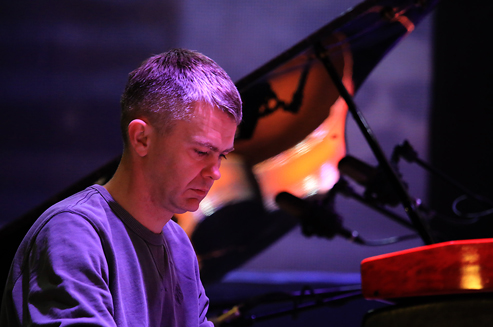How was your band created? What was the idea behind the United States of Beta Project?
The United States of Beta was Marcin’s idea (editor’s note: Marcin Pchałka – the producer of the album). Our friend, Piotrek Korzeniowski, said that it was impossible to make good music in this country. Marcin decided to prove him wrong. At the beginning Janek Wierzbicki played the bass, Wojtek played the conga drums and I played the keyboard… We also worked with some vocalists. At first it was Maya Takeuchi who has Polish-Japanese expression which, combined with ethno jazz, gives very interesting results. We decided we didn’t want to make such a record though and we kept looking. Maya became our song writer. Marysia Klatka was next. She is an improvisation animal that is not easily tamed. We worked for a few months and some traces of that can be found on the record. The conga drums were played by Ania Patynek, later replaced by Bartek Nazaruk with the drum kit.
Anna Józefina Lubieniecka was our desired vocalist almost since the moment we had started talking about signing. At the beginning she refused. She told us she was committed to Varius Manx and that it was her priority. After six months we recorded four songs together. Still we decided it would be worthwhile to visit different styles and that the more vocalists we had the better. We weren’t sure if all the songs would work together but later we only matched particular compositions and tones with specific people and that was it. Since the beginning we assumed that we would like to entrance the audience with our music, to relax it, to reach sophisticated ears but also to present refined and unknown sides of jazz in an approachable way.
Where did the idea to make the “Poles Jazz the World” record come from? What was your inspiration?
I think it was mainly the people around us. We knew a few foreign vocalists who live in Warsaw. Mixing their culture with our sensitivity has made a fascinating combination. We drew from one another. We played together. Marcin was a producer. He told us how we should play. After a few clashes we learned how to trust one another. He was able to remember the date and the number of a record we made months ago and told us to play in the same way. And we did. And it worked. In the meantime we had a lomilomi massage and we went to a banya. Together with Marysia and Ania Patynek we also went to the Little Beskid Mountains to spend a few days in a chalet with some instruments, a computer, lots of cables, microphones, etc. We played nonstop. Marcin also always recommended us some beautifully published records, which we listened to and studied thoroughly.
Was the material for the record planned in advance or was it created and changed in the process, while you were recording and talking with the vocalists?
Every song had a different story. We played one composition over and over again in many different versions. Long weeks had passed and we couldn’t get to the core. We came up with new arrangements…
There is one song about people experiencing death. It wasn’t easy. We played it until we had no more doubts. Then Magda Navarrete got the music and she wrote the lyrics. The song is titled “As lineas de tua cara.”
Other compositions were easier to make and the vocalists received both the music and the lyrics. The exception was the song performed by Maria Sadowska – she composed the music and wrote the lyrics herself. While working on Józefina’s songs we had many conversations, we analysed different versions and melodies. We also suggested various solutions to Józia. Sometimes she followed them but many a times she didn’t.
How did you choose the vocalists?
We imagined who could sign a certain song well or who liked this kind of music. Everything came together quickly. I remember we had a list with songs and names written in two columns. There were much more songs and names than you can find on the record. We had a brainstorm and we matched artists with the compositions that suited them most. Then we sent them our compositions.
How much were the guest artists free to interfere and change the initial idea of the record?
All the nuances had been well-thought-out before we started recording, during rehearsals, our conversations and talks with Józefina, so there was nothing to change. Every vocalist sang in his or her natural way and it seems most truthful. Everyone brought in his or her OWN energy and expression which, combined with our music, met our expectations.
What did this project give you? What did you discover for yourself? What have you learned?
I always wanted to play the piano. The project woke me up from a kind of lethargy. I play more now, mainly the piano. I also started to think about different aspects of performing music on a universal level. In music there are no boundaries, no differences, no racial conflicts, no politics, no aggression… there’s only time and space created together and expressing emotions… It’s metaphysics. It seems to be the only tangible contact with the absolute we can have.
What do you normally do apart from the United States of Beta Project?
Music has dominated the life of every one of us. I hope it stays this way.
 The album “United States of Beta – Poles Jazz the World” was created entirely by a group of instrumentalists from Warsaw: Artur Bogusławski – pianist, heart of the project, versatile musician, Bartosz Nazaruk – drums, rythm section in Kayah & Transoriental Orchestra, Janek Wierzbicki – emerging bass talent, Bogusz Wekka – percussions, on stage along with Bobby McFerrin, Przemek Kostrzewa – trumpet, for opinions please refer to Tomasz Stańko, Andrzej Karp – sound engineer, the only Pole wandering in the studio of Petera Gabriela and guest vocalists: Maria Sadowska, Magda Navarrete, Anna Józefina Lubieniecka, Kasia Nowicka (Novika), Michał Rudaś, Katarzyna Kurzawska, Małgorzata Hutek and Nick Sinckler.
The album “United States of Beta – Poles Jazz the World” was created entirely by a group of instrumentalists from Warsaw: Artur Bogusławski – pianist, heart of the project, versatile musician, Bartosz Nazaruk – drums, rythm section in Kayah & Transoriental Orchestra, Janek Wierzbicki – emerging bass talent, Bogusz Wekka – percussions, on stage along with Bobby McFerrin, Przemek Kostrzewa – trumpet, for opinions please refer to Tomasz Stańko, Andrzej Karp – sound engineer, the only Pole wandering in the studio of Petera Gabriela and guest vocalists: Maria Sadowska, Magda Navarrete, Anna Józefina Lubieniecka, Kasia Nowicka (Novika), Michał Rudaś, Katarzyna Kurzawska, Małgorzata Hutek and Nick Sinckler.
The album “United States of Beta – Poles Jazz the World”, composed of an LP and a photo album of over hundred pages by an excellent photographer, Piotr Malczewski.
More information about the project you can find on: United States of Beta
Listen to one of the songs from the album:


